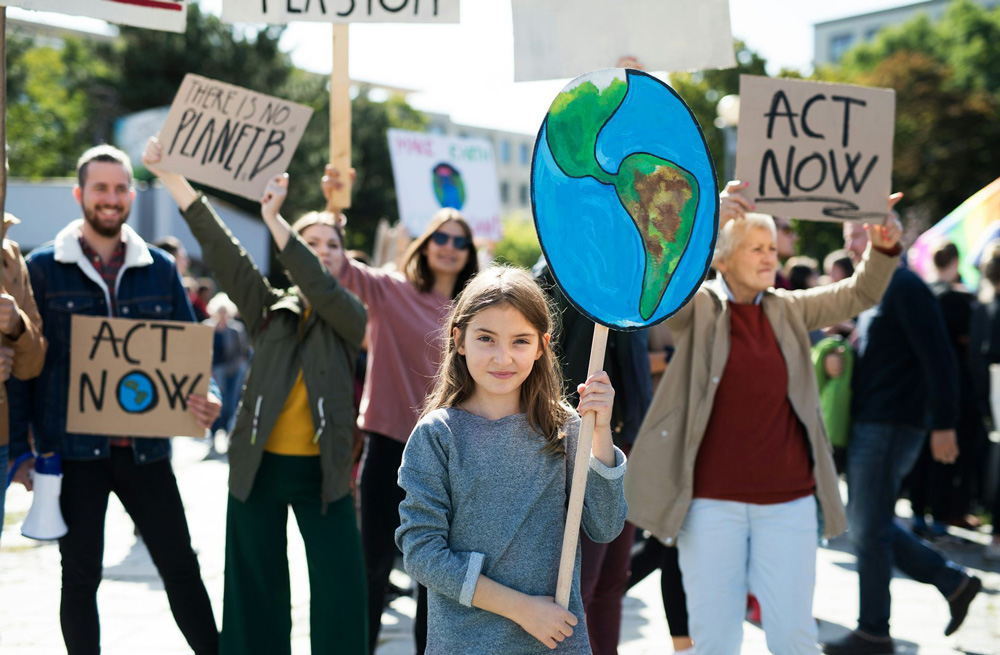
By Trevor Hedberg
People born in the future stand to inherit a planet in the midst of a global ecological crisis. Natural habitats are being decimated, the world is growing hotter, and scientists fear we are experiencing the sixth mass extinction event in Earth’s history.
Under such circumstances, is it reasonable to bring a child into the world?
My philosophical research deals with environmental and procreative ethics – the ethics of choosing how many children to have or whether to have them at all. Recently, my work has explored questions where these two fields intersect, such as how climate change should affect decision-making about having a family.
Procreation is often viewed as a personal or private choice that should not be scrutinized. However, it is a choice that affects others: the parents, the children themselves and the people who will inhabit the world alongside those children in the future. Thus, it is an appropriate topic for moral reflection.
A lifelong footprint
Let’s start by thinking about why it might be wrong to have a large family.
Many people who care about the environment believe they are obligated to try to reduce their impact: driving fuel-efficient vehicles, recycling and purchasing food locally, for example.
But the decision to have a child – to create another person who will most likely adopt a similar lifestyle to your own – vastly outweighs the impact of these activities. Based on the average distance a car travels each year, people in developed countries can save the equivalent of 2.4 metric tons of CO2 emissions each year by living without a vehicle, according to one literature review. For comparison, having one fewer child saves 58.6 metric tons each year.
So, if you think you are obligated to do other activities to reduce your impact on the environment, you should limit your family size, too.
In response, however, some people may argue that adding a single person to a planet of 8 billion cannot make a meaningful difference. According to this argument, one new person would constitute such a tiny percentage of the overall contribution to climate change and other environmental problems that the impact would be morally negligible.
Crunching the numbers
Environmental ethicists debate how to quantify an individual’s impact on the environment, especially their lifetime carbon emissions.
For example, statistician Paul Murtaugh and scientist Michael Schlax attempted to estimate the “carbon legacy” tied to a couple’s choice to procreate. They estimated the total lifetime emissions of individuals living in the world’s most populous 11 countries. They also assumed a parent was responsible for all emissions tied to their genetic lineage: all of their own emissions, half their children’s emissions, one-quarter of their grandchildren’s emissions, and so on.

PhotoAlto/Ale Ventura/PhotoAlto Agency RF Collections via Getty Images
If emissions stayed similar to 2005 levels for several generations, an American couple having one fewer child would save 9,441 metric tons of CO2-equivalent, according to their calculations. Driving a more fuel-efficient car, on the other hand – getting 10 more miles to the gallon – would save only 148 metric tons of CO2-equivalent.
Philosopher John Nolt has attempted to estimate how much harm the average American causes over their lifetime in terms of greenhouse gas emissions. He found that the average American contributes roughly one two-billionth of the total greenhouse gases that cause climate change. But since climate change may harm billions of people over the next millennium, this person may be responsible for the severe suffering, or even death, of one or two future people.
Collective toll
Such estimates are, at best, imprecise. Nevertheless, even if one assumes that each individual child’s impact on the environment is relatively insignificant on the global scale, that does not necessarily mean that procreators are off the moral hook.
One common thought in ethics is that people should avoid participating in enterprises that involve collective wrongdoing. In other words, we should avoid contributing to institutions and practices that cause bad outcomes, even if our own individual contribution to that outcome is tiny.
Suppose someone considers making a small donation to an organization that they learn is engaged in immoral activities, such as polluting a local river. Even if the potential donation is only a few dollars – too small to make any difference to the organization’s operations – that money would express a degree of complicity in that behavior, or perhaps even an endorsement. The morally right thing to do is avoid supporting the organization when possible.
We could reason the same way about procreation: Overpopulation is a collective problem that is degrading the environment and causing harm, so individuals should reduce their contribution to it when they can.
Moral gray zone
But perhaps having children warrants an exception. Parenthood is often a crucial part of people’s life plans and makes their lives far more meaningful, even if it does come at a cost to the planet. Some people believe reproductive freedom is so important that no one should feel moral pressure to restrict the size of their family.

Abraham Gonzalez Fernandez/Moment via Getty Images
One point of general consensus among ethicists, following the lead of philosopher Henry Shue, is that there is a moral difference between emissions tied to crucial interests and those that are tied to convenience and luxury. Emissions connected to basic human needs are usually regarded as permissible. It isn’t wrong for me to emit carbon to drive to the grocery store, for example, if I have no other safe or reliable transportation available. Getting to the store is important to my survival and well-being. Driving purely for recreation, in contrast, is harder to justify.
Reproduction occupies the messy conceptual space between these two activities. For most people today, having their own biological children is not essential to health or survival. Yet it is also far more important to most people and their broader life plans than a frivolous joyride. Is there a way to balance the varied and competing moral considerations in play here?
In prior work, I have argued the proper way to balance these competing moral considerations is for each couple to have no more than two biological children. I believe this allows a couple an appropriate amount of reproductive freedom while also recognizing the moral significance of the environmental problems linked to population growth.
Some authors reason about this issue differently, though. Philosopher Sarah Conly argues that it is permissible for couples to have only one biological child. In large part, her position rests on her argument that all the fundamental interests tied to child-rearing can be satisfied with just one child. Bioethicist Travis Reider argues in favor of having a small family, but without a specific numerical limit. It is also possible, as ethicist Kalle Grill has argued, that none of these positions gets the moral calculus exactly right.
Regardless, it is clear that prospective parents should reflect on the moral dimensions of procreation and its importance to their life plans.
For some, adoption may be the best way of experiencing parenthood without creating a new person. And there are many other ways for prospective parents to do their part in mitigating environmental problems. Carbon offsets or donations to environmental organizations, for example, are hardly perfect substitutes for limiting procreation – but they certainly may be more appealing to many prospective parents.
![]()
Trevor Hedberg is Assistant Professor of Practice in the W.A. Franke Honors College, Philosophy Department, at the University of Arizona.





























whiplash says
He is another progressive idiot! This is what the CCP required of it’s Chinese people! No more than 2 children per family. He needs to move to China where they are now finding that their policy has created a shortage of workers and is causing economic issues!
Mary Fusco says
Whiplash, amazingly procreation in America is beyond comprehension yet we have a severe shortage of workers. How do we explain that?
TR says
I have a few ideas as to why there is shortage of workers.
1. Because the younger generation has been given everything by their parents where they don’t have to work. Now if they are older they think they are entitled and if they do get a job they want to start at the top.
2. Unemployment is to high and is allowed to be collected for too long a period.
3. No incentive for someone to work since the pandemic.
4. Technology is taking over, where the younger kids just want to play video games instead of getting a job.
Ed P says
Agree. What’s next, mass suicide to save the planet? Or better yet, let’s euthanize the elderly, starting with the boomers since it’s their fault anyway.
Just when I think it can’t possibly get anymore ridiculous, damn it it does. Isn’t there a bottom so we can bounce back up to reality?
Pogo says
@FWIW
As stated
https://www.google.com/search?q=birth+rate+by+country+history
protonbeam says
Thank you for proving the axion “we have educated ourselves to the point of imbecility” – I read this horrific piece thinking it was satire, and that it would be revealed as such. I have never subscribed to the concepts of “White privilege or White Supremacy” , but if they can be proven to exist this guy is a poster child. He argues to impose his euro-western pseudo moral superiority as a global moral imperative (I visited his academic page and CV, this guy is certifiable) – Flagler Live, ask for a refund for this paid content, there is a stark difference between thought provoking and the absurd – this is neither. This dangerous and sick pseudo dualism pits man against the universe and drives the “life boat” mentality that pits people against people to the death. I am in shock this garbage was published.
Pogo says
@P.T.
4 out of 5 comments by Putin’s Bitch supporters, and some, Opus Dei strength weird thrown in.